
Context
Food systems are at a crossroads: they are facing multidimensional and complex challenges that cannot be addressed using a “business as usual” approach. Only a profound transformation of the food systems can lead to improved nutrition and food security for all. These challenges are of various natures: environmental (increased pressure and competition over natural resources, climate change, biodiversity loss, land degradation, water scarcity) and socio-political (power imbalances, lack of transparency, accountability and democracy in governance). To shape the transformation of agriculture and food systems, two types of transitions should take place in a coordinated and integrated way (HLPE): incremental change (at agroecosystem level) and structural changes (consumers’ culture, institutions and norms at food system level).
Agroecology is a dynamic concept that has gained prominence in scientific, agricultural and political discourse in recent years. Agroecology – “the application of ecological concepts and principles to the design and management of sustainable agro-ecosystems” has three facets. It is a scientific discipline; a set of practices and a movement.
The three facets of agroecology
Agroecology as a science is interdisciplinary, embraces local knowledge and combines it with science.
Agroecology as a practice applies ecological principles – such as recycling, resource use efficiency, reducing external inputs, diversification, integration, soil health and synergies, for the design of food systems that strengthen the interactions between plants, animals, humans and the environment for food security and nutrition . Agroecological practices try to harness, maintain and enhance biological and ecological processes in food systems and to create more stable, resilient and productive agroecosystems. They involve processes that decrease the use of external inputs and enhance ecological footprint. Meanwhile, there is no definitive set of practices proscribed as agroecological.
Agroecology as a social and political movement: Agroecology is not only “a narrow set of technologies” but a political struggle, requiring people to “challenge and transform structures of power in society”, addressing power imbalances and conflicts of interest, in order to “generate local knowledge, promote social justice, nurture identity and culture, and strengthen the economic viability of rural areas”.
SDC's approach
Willing to contribute in addressing such global challenges, SDC’s Global Programme Food Security (GPFS) considers agroecology a legitimate vision to avoid the clashes and dead-ends the current evolutions of the food system are leading the world population into, and to foster the needed transformation of food systems. For GPFS, agroecology is a pertinent pathway towards sustainable food systems. Agroecology aims to apply ecological principles and to ensure a regenerative use of natural resources and ecosystem services while also addressing the need for socially equitable food systems within which people can exercise choice over what they eat and how and where it is produced.
Key resources
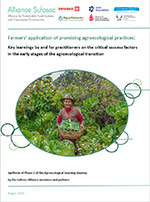 Farmers’ application of promising agroecological practices:
Farmers’ application of promising agroecological practices:
Key learnings by and for practitioners on the critical success factors in the early stages of the agroecological transition
Synthesis of Phase 2 of the Agroecological Learning Journey
by the Sufosec Alliance members and partners, August 2023
[
version française |
versión en español ]
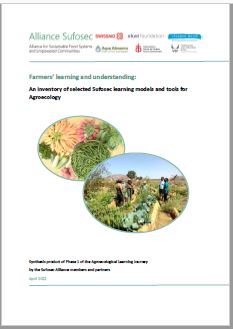 Farmers’ learning and understanding: An inventory of selected Sufosec learning models and tools for Agroecology
Farmers’ learning and understanding: An inventory of selected Sufosec learning models and tools for Agroecology
Synthesis of Phase 1 of the Agroecological Learning Journey by the Sufosec Alliance members and partners, April 2022
[
version française |
versión en español ]
 Policy recommendations on agroecological and other innovative approaches for sustainable agriculture and food systems that enhance food security and nutrition
Policy recommendations on agroecological and other innovative approaches for sustainable agriculture and food systems that enhance food security and nutrition
Committee on World Food Security, 2021
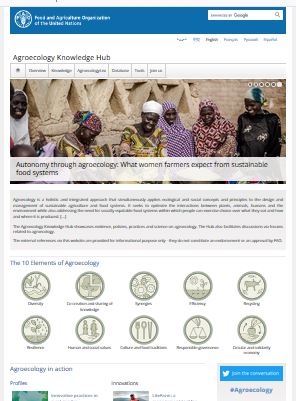 Agroecology Knowledge Hub
Agroecology Knowledge Hub
Food and Agriculture Organization of the United Nations
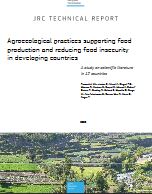 Agroecological practices supporting food production and reducing food insecurity in developing countries
Agroecological practices supporting food production and reducing food insecurity in developing countries
JRC Technical Report, European Commission, September 2020
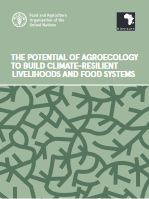 The potential of agroecology to build climate-resilient livelihoods and food systems
The potential of agroecology to build climate-resilient livelihoods and food systems
Leippert, F., Darmaun, M., Bernoux, M. and Mpheshea, M.;
FAO and Biovision, 2020
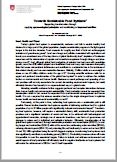 Towards Sustainable Food Systems - Supporting transformation through applying agro-ecological principles and contributing to improved nutrition
Towards Sustainable Food Systems - Supporting transformation through applying agro-ecological principles and contributing to improved nutrition
An amendment to the Global Programme Food Security’s Strategy 2017 - 2020, SDC-GPFS, January 2020
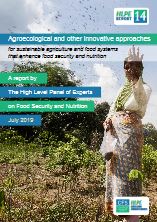 Agroecological and other innovative approaches for sustainable agriculture and food systems that enhance food security and nutrition
Agroecological and other innovative approaches for sustainable agriculture and food systems that enhance food security and nutrition
HLPE, July 2019
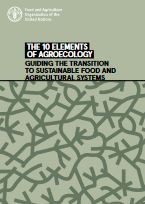 10 Elements of Agroecology
10 Elements of Agroecology
Guiding the Transition to Sustainable Food and Agricultural Systems
FAO, 2018
Projects
Farming Systems Comparison in the Tropics (India, Kenya, Bolivia)
The project aims to establish a scientific basis for discussions on the performance and potential of conventional and organic agricultural production systems in the tropics.
Overview of context and aim (SDC project database)
Project website
ProEcoAfrica (Ghana, Kenya)
The project generates scientific evidence on the productivity and profitability of conventional and organic production systems in Ghana and Kenya with an emphasis on the gender dimension to farming.
Project website
Ecological Organic Agriculture (Africa)
This initiative seeks to mainstream Ecological Organic Agriculture into national agricultural systems by 2025 in order to improve the quality of life for all African citizens.
Overview of context and aim (SDC project database)
Project website
RUNRES (Ethiopia, Rwanda, DR Congo, South Africa)
This public private partnership program aims to increase competitiveness of an environmentally responsible and inclusive cocoa value chain through capacity building of smallholder farmers
Overview of context and aim (SDC project database)
Project website
Community
Transforming Food Systems with Agroecology
On 27 September 2018 SDC's Global Programme Food Security (GPFS) with partners from science, civil society, the private and public sector has organized a learning forum on the current state and perspectives of agroecology in research and policy.
Browse the synthesis and presentations!
